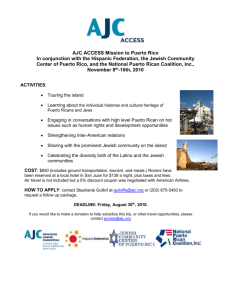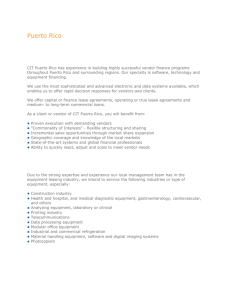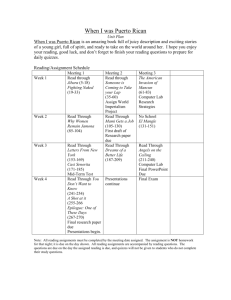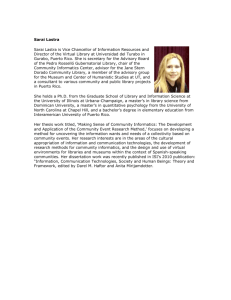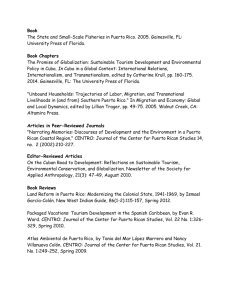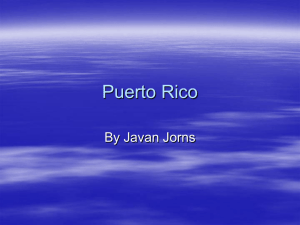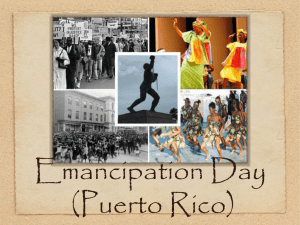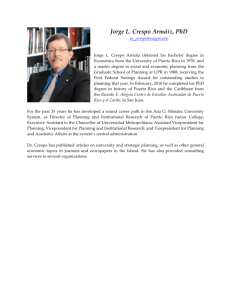Both spanish and English are the official languages of Puerto Rico
advertisement
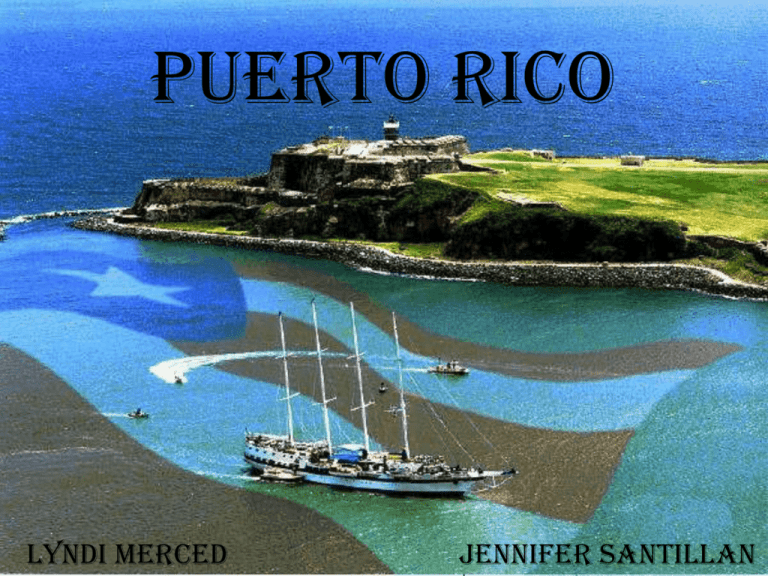
PUERTO RICO LYNDI MERCED JENNIFER SANTILLAN Key Data Puerto Rico- Capital: San Juan Population: 3.8 million people Climate: Falls into the tropical Climate zone. Temperatures are moderates year round, averaging near 70 Fahrenheit in lower elevations, and 70 Fahrenheit in the mountains. Languages: Both spanish and English are the official languages of Puerto Rico,but Spanish is without a doubt the dominate language. Type of currency: Untied States Dollar 1 cent- centivo or chavito 5 cent- villon or ficha 25 cent-pesta Economy: Puerto Rico has one of the most dynamic economies in the Caribbean Region. Recently the economy has suffered budget cuts from United States. Te puerto Rico economy has depended heavily on the tax incentives given to United States main land companies and on Fedral transfer. AGRICULTURE: Land in agriculture: 51.9% Agricultural population density: 713 persons per sq km Total agricultural workers: 36,000 Agricultural workers: 3% of work-force Sugar- 1,261,000 metric tons Fruits- 249,000 metric tons Plantains- 80,000 metric tons Bananas- 65,000 metric tons Vegetables- 45,000 metric tons Oranges- 25,000 metric tons Coffee- 15,000 metric tons Yams- 12,000 metric tons Papayas- 4,000 metric tons Cassavas- 2,000 metric tons Lemons and Limes- 2,000 metric tons Cereal- 1,000 metric tons Rice- 1,000 metric tons Animals: Chickens- 10,000,000 Cattle- 592,000 Pigs- 195,000 Horses- 22,000 Goats- 14,000 Sheep- 7,000 Mules- 3,000 Asses- 2,000 AGRICULTURE Animal products: Total Meat- 86,000 metric tons Poultry- 40,000 metric tons Beef- 23,000 metric tons Pig Meat- 22,000 metric tons Dairy Products: Cow Milk- 348,000 metric tons Miscellaneous products: Eggs- 15,550 metric tons Fish Catches- 1,200 metric tons Honey- 90 metric tons Puerto Rican Culture Religion: The dominant religion in Puerto Rico is Catholic. About 85% of Puerto Ricos population is Catholic. - Protestants (8%) - Non religious (2.3%) - Others (3%) Music: The music of Puerto Rico has been influenced by the Spanish, African, Tanio Indians, France, and the United States, and has become very popular across the Caribbean and across the globe. Native popular genres include bomba, plena, and seis, while more modern innovations include the fusion reggeaton, also Puerto Rican calypso, reggae, and soca. Today in Puerto Rico the most widely heard genre of music is Salsa. Salsa is the most influential music heard from Puerto Rico. Puerto Rican Holidays: -November 19 Día del Descubrimiento de Puerto Rico (Discovery of Puerto Rico Day) - July 25 Conmemoración del Estado Libre Asociado (Commonwealth of Puerto Rico) - National Puerto Rican Day Parade (the most important day (: lol) it is one of the largest parades in New York City, with nearly three million spectators annually Ethnic Backround : Three main ethnic strands reflect the heritage of Puerto Rico: the Taino Indians; Black Africans, and Spanish. flag The White stripes symbolize victory, liberty and independence. The Red stripes symbolize the'blood' that nourishes the government or that of brave warriors. The blue triangle represents both the three sides of government and the blue waters of the ocean, while the white star symbolizes the islandcountry of Puerto Rico. (the sky and coastal waters of this beautiful Caribbean island). “Many people see the red, white and blue of the Puerto Rican flag and simply assume that this is an offshoot of the American flag. Not true. The flag was created in 1895 by the Puerto Rican section of the Cuban Revolutionary Party in New York City. These Cubans and Puerto Ricans were, in fact, independentistas; that is, they wanted independence from Spain, and there was a revolution in Cuba at that very moment. Lola Rodríguez de Tío, a Puerto Rican independentista poet who also penned the words to La Borinqueña, the national anthem, in 1867, wrote that Cuba and Puerto Rico were “two wings of the same bird;” they received “flowers and bullets in the same heart.” The Puerto Rican Flag was created after the Cuban flag, the two flags are very similar because of shared experiences amongst the two nationalities REPRESENTATIVE FIGURE Oscar Lopez Rivera born in San Sebastian, Puerto Rico on January 6, 1943. At the age of 12, he moved to Chicago with his family. He was a well-respected community activist and a prominent independence leader for many years prior to his arrest. Oscar was one of the founders of the Rafael Cancel Miranda High School, now known as the Dr. Pedro Albizu Campos High School(Which is located here in Chicago by Division And California) and the Juan Antonio Corretjer Puerto Rican Cultural Center. He was a community organizer for the Northwest Community Organization (NCO), ASSPA, ASPIRA and the 1st Congregational Church of Chicago. He helped to found FREE, (a half-way house for convicted drug addicts) and ALAS (an educational program for Latino prisoners at Stateville Prison in IllinoisH. He was active in various community struggles, mainly in the area of health care, employmenT and police brutality. He also participated in the development of the Committee to Free the Five Puerto Rican Nationalists. In 1975, he was forced underground, along with other comrades. He was captured on May 29, 1981, after 5 years of being persecuted by the FBI as one of the most feared fugitives from US "justice". Oscar, who has a daughter named Clarissa, is currently serving a 55-year sentence for seditious conspiracy and other charges. He was convicted of conspiracy to escape along with Jaime Delgado, (a veteran independence leader), Dora Garcia, (a prominent community activist) and Kojo Bomani-Sababu, a New Afrikan political prisoner. Oscar was one of 12 Puerto Rican political prisoners offered some form of leniency by the Clinton Administration in the fall of 1999. According to the Chicago Sun Times, he "declined the president's offer, which still would have him left with 10 years to serve on conspiracy to escape charges. Now he faces at least 20 more years in prison. His sister, Zenaida Lopez, said he turned the offer down because he would be on parole. 'Accepting what they are offering him is like prison outside of prison,' she said. Zenaida Lopez said her brother 'was in total agreement' with the decision of the 11 others to take the conditional clemency." Oscar is presently in prison in Terre Haute, Indiana and his release date is 7/27/2027. He is a US held Puerto Rican political prisoner & prisoner of war. He has been in prison since 1981 and is serving a sentence of 70 years. Puerto Rico has been a colony of the United States since 1898 and Oscar is a part of a long history of resistance to US colonialism in Puerto Rico. López, arrested in 1981, is serving a sentence of 70 years for seditious conspiracy, for his commitment to the independence of Puerto Rico. He was not accused or convicted of causing harm or taking a life. His projected release date is in 2023. Having already served 29 years behind bars, including over 12 years in torturous conditions of total isolation and sensory deprivation, this 67-year-old man is among the longest held political prisoners in the history of Puerto Rico and in the world.
